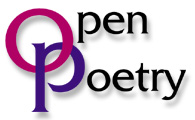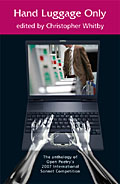Open Poetry Ltd Launched the 2007 International Sonnet Competition
In 2007 Open Poetry Ltd has launched an international sonnet competition. This was the competition's website.
Content is from the site's 2007 archived pages.
International Sonnet Competition launched
Open Poetry Ltd has launched an international sonnet competition, closing October 31, 2007. First prize is £1,400, and the judging panel comprises Susan Bassnett (UK academic and poet), Jacqueline Osherow (USA poet) and Don Paterson (UK poet).
The Open Poetry Competition invites entries from anywhere in the world - or the universe for that matter - for our inaugural competition running from 10 January 2007 to 31 October 2007 (closing at midnight). Top prize is a £1400, second prize is £750 and third prize is £350 (minima). If the number of entries allow us to increase the prize money, we will. The judges may at their discretion award additional prizes of up to £100 for entries that received high commendation but did not make it into the top three. Also we hope to publish the best entries in book form at the end of the competition.
Entries can be submitted via this website or by post any time until midnight (GMT) on 31 October 2007. If submitting on-line by clicking on the 'On-Line Entry Form' menu, payment of the entry fee is via a Paypal payment page (automatically in GB Pounds Sterling). If submitting by post, you must include an application form, either downloaded from this site (click on 'Download Entry Form' menu) or as can be found in one of our publicity leaflets. Whether you enter or not, if you write sonnets, you can also add your name to our list of sonnet poets (use 'Sonnet Poets' menu).
If you think you can help publicise the competition, please do so by word of mouth, email, local radio or any other means at your disposal. We would be happy to send a quantity of leaflets and bookmarks for giving out at societies, clubs etc, so please contact us via the 'Ask for a Leaflet' link on the left, if you would like us to do so.

The Rules |
||||||||
|
The main rules are very simple: |
||||||||
|
|
||||||||
|
||||||||
The Judges 2007 |
||||||||||||||||||||||||||||||||||||||||||||||||
|
||||||||||||||||||||||||||||||||||||||||||||||||
Traditional Sonnets |
||||||
|
And if no peece of Chronicle wee prove, Italian sonnets tend to have 11syllables (excluding elisions) in each line, while English sonnets tend to have 10 syllables per line in an iambic pattern (unstressed syllable, stressed syllable), although most poets will play with metre at one time another. One of the points about repetitive metric patterns, just like beats in music, is the opportunity they create to suddenly change the pattern or beat for effect, whether that be emphasis, surprise, a sense of speeding up or slowing down, etc. If you are really interested in the history of the sonnet, we recommend Michael Spiller's book cited at the top of this page (ISBN 0-415-07744-3 & 0-415-08741-4 pbk) from which much of the above has been gleaned. You may also wish to look at www.sonnets.org, and there are many other sites devoted to sonnets on the Internet. |
||||||
Some Ideas |
|||||||||||||||||||||||||||||||||||||||||||
|
When people discuss sonnets, they usually argue for two forms: Petrarchan and Shakespearean, although we can also talk of Spenserian. If you are uncertain about these structures, which are largely to do with rhyme scheme and metre, and want to find out more, click here. They proved popular forms and have been much imitated, but they are not by any means the only forms for a sonnet. After all, like other poetry, a sonnet does not have to rhyme. And just as the Shakespearean sonnet form was an innovation on the Petrarchan, so your sonnets can be innovatory too. This is the 21st century. You can imitate a traditional style with modern content, or play with the style too and come up with your own format within the 14 line basic rule, which is the only structural rule we are operating. Sonnets are actually incredibly flexible, despite the apparent constriction of the line number. If you do want to rhyme, what about breaking with tradition in any of the following ways? |
|||||||||||||||||||||||||||||||||||||||||||
|
Using some triplets. For example: 4 sets of triplets and a finishing couplet, or abbbcccdddeeea, or abbbcccadddeee or any combination of triplets and couplets *. |
|||||||||||||||||||||||||||||||||||||||||||
|
Rhyming penultimate words, or floating the rhyme in different positions in each line. |
|||||||||||||||||||||||||||||||||||||||||||
|
Rhyming 7 lines apart (1 & 7, 2 & 8 etc). |
|||||||||||||||||||||||||||||||||||||||||||
|
Traditional sonnets often have some kind of change of thought or pattern between the first 8 and the last 6 lines, but what about playing with numbers in the way lines are joined together by sense or rhyme? It's a bit like deciding your attacking//defensive pattern in football with 14 aside - look at some sample combinations: |
|||||||||||||||||||||||||||||||||||||||||||
| What about playing with line lengths? While the traditional sonnet tends to use the iambic pentameter (10 syllables in unstressed, stressed pattern) because it seems to suit English well, there's no need at all to stick to it. Line length is your choice and doesn't need to be the same for every line. Rhythms are your choice too. | |||||||||||||||||||||||||||||||||||||||||||
|
The tone can be lyrical, angry, conversational, introspective, gritty, bubbly - whatever your poem demands.
|
|||||||||||||||||||||||||||||||||||||||||||
| [* If you are new to the use of letters to designate rhyming schemes, the first line rhyme is marked as a and any line that rhymes with that is also designated as a. The next new rhyme is b and any lines rhyming with that are also b, and so on to line 14, each new rhyme moving on a letter.] | |||||||||||||||||||||||||||||||||||||||||||
|
|||||||||||||||||||||||||||||||||||||||||||
|
|
|||||||||||||||||||||||||||||||||||||||||||

Sonnet of the Week |
||||||
|
For copyright reasons, we are unfortunately unable to publish (as yet) the work of most established modern poets, but each week we will place here an example of a good sonnet for which, to the best of our knowledge, copyright is not an issue. On the Edition of Mr Pope's Works with a Commentary and Notes In evil hour did Pope's declining age Thomas Edwards This is sonnet xxvi from The Canons of Criticism (1765) and addressed to William Warburton (whose maid incidentally is thought to have used some of the last surviving Shakespeare manuscripts, then in Warburton's library, to line pie dishes - a not uncommon use of old manuscripts). So the sonnet is usually about love? Not so with what might be called the Savage Sonnet, like this.. |
||||||
OPEN POETRY SONNET COMPETITION |
|||||
|
We would very much like to run the Open Poetry International Sonnet Competion again, but times being what they are, we are unable to underwrite the costs without support as we did before. Sponsorship would be most welcome, but equally useful would be simple underwriting. The 2007 competition was in the end self-financing (see link to accounts below), but it was a big risk to take without any backing other than personal finances. One of the problems we have found in seeking backing, apart from there being considerably less arts funding around now, is that the competition is international. So much arts support is concerned with developing local audiences that as soon as one mentions 'worldwide' there is a shaking of heads and a closing of doors. Do contact us (link button on left) if you can help or have any ideas of where we might find an underwriter or two for an international sonnet competition.
|
|||||
|
Hand Luggage Only The anthology of the 2007 Open Poetry International Sonnet Competition is now available for ordering online and by post. For online orders worldwide, click on the link below:
|
 |
||||
Hand Luggage Only: £7.99 each From 4 April 2011, UK post & packing is £1 per copy for 1-5 copies. 6-10 copies = £5 flat fee. Post & packing costs to destinations outside the UK are shown on the book order page. For orders over 10 copies, email us at info@openpoetry.org.uk or call us on 01455 852522 (office hours) as we may use an alternative to Royal Mail. --------------------------------------------------------------------------------------------------------- 2007 Competition Winners 1st Prize: Julie Kane – 'Used Book' --------------------------------------------------------------------------------------------------------- |
|||||
|
You are welcome to add your name to our list of sonneteers by clicking on the 'Sonnet poets' link in the left hand row of buttons. If you wish to create a link from your own website to ours, click here. |
|||||
2007 Sonnet Competition Accounts |
|||||||
|
For reasons of transparency and because it might help anyone else thinking of starting a poetry competition, we present here what no other poetry competition seems to do: an explanation of the competition accounts. One important thing to bear in mind when reading the accounts is that while the competition entry fee was £7 per sonnet, there was a consistent '3 entries for the price of 2' offer and that when entries were made online, Paypal would deduct a transaction fee, a percentage commission, and in the case of non-UK currency transactions a further currency conversion commission. This is standard practice for e-commerce, but it meant that a set of 3 sonnets from an overseas entrant could reduce the revenue per sonnet to £4.41. These commissions are the reason why the entry fee revenue is not a multiple of £7. Open Poetry Ltd is not VAT registered, as while that would have enabled us to offset VAT on expenditure, it would also have meant adding VAT to the entry fee. |
|||||||
| Income |
£
|
||||||
| Entry Fees Bank Interest |
9779.26
33.86 |
||||||
|
|
|||||||
| Total Income |
9813.12
|
||||||
| Expenses | |||||||
| Advertising | Google Adwords, magazines and 2006-07 annual web hosting and name registration costs |
651.21
|
|||||
| Bank charges |
65.50
|
See note 1. | |||||
| Marketing | Launch PR and similar |
235.00
|
|||||
| Payroll | Student at £6 per hour harvesting email addresses of creative writing courses, e-zines, and other areas for publicity |
450.00
|
See note 2. | ||||
| Postage etc | Mailed leaflets and delivery of boxes of leaflets to libraries etc |
154.48
|
|||||
| Printing | Leaflets & bookmarks, photocopying entries |
722.02
|
|||||
| Accountancy | Company set up, record keeping and 2007 audit |
1096.05
|
|||||
| Legal | Companies House annual registration fee |
15.00
|
|||||
| Travel | Reimbursed expenses |
71.10
|
|||||
| Prize money and judges' fees |
4300.00
|
||||||
| Website hosting | 2007-2008: 2 main sites and 7 others directing traffic to these two |
244.20
|
|||||
| Reception | For anthologised poets (room hire & drinks - Cambridge) |
395.00
|
|||||
| Total Expense |
8376.72
|
||||||
| Subtotal | excluding anthology |
1436.40
|
|||||
| Loss on anthology as at 30 August 2008 * |
-571.40
|
See note 3. | |||||
| Surplus |
865.00
|
See note 4. | |||||
| *Anthology costs |
|
||||||
| Design, artwork and proofing |
500.00
|
||||||
| Printing & ISBN number fees |
928.05
|
||||||
| Postage & packing on orders |
212.58
|
||||||
| PR and marketing to launch book |
293.75
|
||||||
| Total anthology expenses |
1934.38
|
||||||
| Anthology Sales (including p&p costs received) to 30/08/08 |
1362.98
|
||||||
| Anthology profit/loss |
-571.40
|
See note 5. | |||||
| Notes | |||||||
| 1. | While the bank offers free banking for up to 100 cheque deposits per month, the last month of the competition exceeded that number. We still thought it better to deposit the cheques rather than hold them back so as to prevent concern amongst entrants. |
||||||
| 2. | The director of Open Poetry Ltd has to date taken no remuneration for the time spent building the competition website and administering entries, or indeed any other time spent on the running the competition. |
||||||
| 3. | Anyone considering printing a book should not forget that design and artwork form a major cost and also needs to consider that if one wants a book reviewed, a significant number of copies need to be sent out free to reviewers (with no guarantee of success). |
||||||
| 4. | This surplus is being held against 2007-2008 accountancy fees and website costs. It will no doubt all disappear into those two areas – mainly the accountant's pocket I should think! |
||||||
| 5. | As the competition was wholly unsubsidised, but personally underwritten, it was not possible to offer a complimentary copy to the anthologised poets. We offered a discount instead. We trust that these figures show why complimentary copies were not possible on this occasion. We are seeking sponsors for the next competition and anthology. | ||||||




